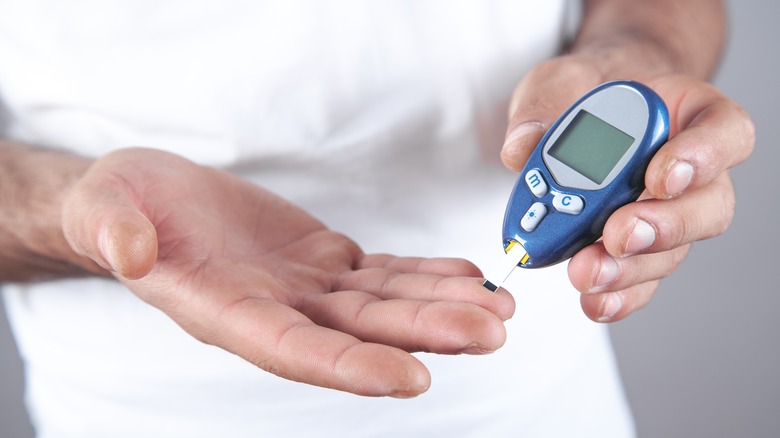Does Having Diabetes Mean You Need A Zero-Sugar Diet?
Diabetes is a disease that affects insulin, a hormone that our body uses to convert glucose into energy, according to the National Institute of Diabetes and Digestive and Kidney Diseases (NIDDK). There are two types of diabetes: type 1 and type 2. With type 1 diabetes, the pancreas does not produce any insulin, and with type 2 diabetes, the body can't utilize insulin properly. Diabetes increases the risks for other conditions such as heart attack, stroke, kidney disease, and nerve damage.
What makes managing diabetes complicated is the fact that the body gets glucose from carbohydrates, one of which is sugar. Not only that, but the body needs carbs for fuel, per the Physicians Committee for Responsible Medicine. Because carbohydrates impact blood sugar levels, it's critical to understand how they work when it comes to managing diabetes. The key to understanding carbohydrates and sugar is knowing how they affect your glucose levels.
Sugar is allowed, but it needs to be monitored
You may have heard that diabetics cannot have sugar, but this isn't true. Certified diabetes care and education specialist Toby Smithson writes that diabetics don't need to avoid sugar, adding that it can be included in a healthy diet (via U.S. News & World Report). That said, there are various forms of sugar carbohydrates, and when it comes to diabetes, the best forms occur naturally in foods. The Mayo Clinic explains that healthy forms of carbs (and sugars) are found in fruits, vegetables, legumes, dairy products, and whole grains.
The American Diabetes Association (ADA) does not have a set limit on how many carbs diabetics should eat daily because it's different for everyone. According to Johns Hopkins, this is because body weight, glycemic control, physical activity, and foods typically consumed can impact this number. The Recommended Dietary Allowance (RDA) for sugar per day is 38 grams for men and 25 for women (via Medical News Today). Some foods will raise blood sugar more than others, as they have a higher glycemic index, and therefore people with diabetes should consistently check their blood sugar to make sure they stay within a healthy range. If you're concerned about your sugar or carb intake, you can always meet with a registered dietician to help you design a healthy eating plan that works for you, per Johns Hopkins.
Healthier diets help manage diabetes
Essentially, incorporating a healthy diet and eating practices can be beneficial for managing your diabetes. For instance, you should be aware that eating at regular times of the day can help your body regulate insulin, whether you're taking medication or not, per the Mayo Clinic. Along with keeping up with your glucose numbers, adding fiber to your diet can help because it can aid in controlling your blood sugar.
According to U.S. News & World Report, the top three diets for helping manage diabetes are the DASH diet, the Mediterranean diet, and a vegan diet. The DASH diet and Mediterranean diet are healthy options because they limit the amount of red meat and sweets, while encouraging more fresh vegetables and fruits. WebMD reports that a vegan diet may help manage type 2 diabetes as well as or better than other diets. That said, it is more restrictive because it doesn't allow for any animal products to be consumed.



